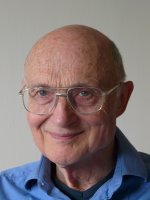
All the versions of this article: [English] [français]
Malcolm Parlett—the introducer of the field theory in Gestalt Therapy—comes to share his sensitive view and the way he thinks about the field today. Above all, he will make us feel the importance of the perceptual change that the adoption of this perspective induces in the conduct of a therapy:
“Too many people approach field theory as a cognitive challenge: in reality it is a living experience and to cultivate a global sensibility”
In 1991 Malcolm Parlett wrote a seminal article in the British Gestalt Journal that definitively brought field theory into gestalt practice. Since then, taken up by many authors and clinicians, this approach has only grown and refined.
As advocated by IDeT, the field perspective renews the handling of the therapeutic relationship and gives it greater importance as a vector of change.
This seminar aims to make the participants feel the deep spring of field practice. It will provide each participant with concrete elements to refine his or her own posture.
This seminar is experiential; it is a unique opportunity to grasp in a sensitive way what guides the practice in a Gestalt therapy field perspective and to deepen our concrete and sensitive understanding of this clinical approach.
english & french translation - Due to the pandemic: Limited number of places
Vincent: I met you twenty years ago and you came last year in France to do a first 2-day seminar. It was here, in our institute, at IDeT. Although you are famous abroad, you are still little known to French gestaltists. Can you briefly tell us who you are and how you came to field theory?
Malcolm: My attraction to the field theory of Gestalt therapy goes back to my early days in Gestalt in the 1970s. At that time I was a consultant and researcher in the educational sciences and was particularly interested in the “learning environment” which is the crucial element in shaping the educational experience. Even earlier I had grown up in a family where disappointment and secrets reigned - a totally pathological field - and my life task was to discover a greater truth, which required a holistic approach.
Vincent : How was the writing of your famous article?
Malcolm: I wrote the article “Reflections on Field Theory” ((British Gestalt Journal, Vol1/2) in 1991 after having been invited to give a lecture on this topic at a gestalt symposium. For six months I immersed myself completely in what had been written by others on the subject, particularly Joel Latner and Gary Yontef. Since then I have continued to write, teach and further develop these ideas and practices, realizing more and more clearly that “field theory” should actually be called “field practice”. Too many people approach field theory as a cognitive challenge: in reality it is about living experience and cultivating a global sensibility.
Vincent: Since then, you’ve been talking about exploring practice in five dimensions. What do you mean by this?
Malcolm: These five dimensions do not correspond to the five principles I described in my 1991 article. Rather, they are the five competencies that I described in the book “Future Sense: Five explorations of whole intelligence for a world that’s waking up” published in 2015 for a non-specialist audience. These are five dimensions of human competence fundamental to global intelligence, i.e. to function healthily in the world and to participate in making it better in the form of personal and social commitment. I call them “responding to the situation”, “interrelating”, “embodying”, “experimenting” and “self-recognizing”.
After this book I have continued my reflection and I have come to believe that for clinicians, each of these five explorations (or dimensions) offers a different starting point for the search for an integrated form of field practice, that is, a practice that creates the experiential conditions in which personal growth can unfold: emotionally, intellectually, socially, politically and spiritually.
Malcolm Parlett, “Reflexions on Field Theory” in British Gestalt Journal, vol 1.2, 1991
Malcolm Parlett, FUTURE SENSE: Five Explorations of Whole Intelligence for a World That’s Waking Up, Troubador, 2015.